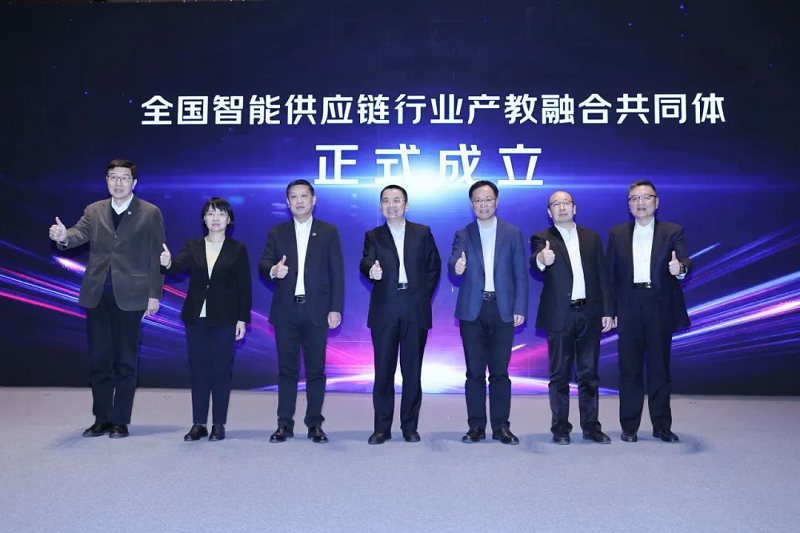发布时间:2023-11-24

On November 23rd, the establishment conference of the National Industry-Education Integration Community of Intelligent Supply Chain Industry (hereafter called the Community), jointly supported and guided by the Tianjin Municipal Commission of Education, the Education and Examination Center of the Ministry of Industry and Information Technology, and the China Federation of Logistics and Purchasing, was successfully held. Wang Xu, Standing Committee member of the CPC Tianjin Municipal Committee and secretary of the Tianjin Municipal Education and Work Committee, attended the founding ceremony. Luo Yan-an, deputy director of Tianjin Municipal Education Commission, Xin Shao-hong, second-level inspector of Tianjin Municipal Bureau of Commerce, Guo Zhao-ming, vice president of China Society of Logistics, Dong Gang, Chairman of China's National Joint Conference of Vocational & Technical College and University Presidents, relevant leaders from Tianjin University, Tianjin Transportation Vocational College, and JD Group attended the meeting. Hao Zhi-qiang, director of the Education and Examination Center of the Ministry of Industry and Information Technology, delivered a video speech at the conference.
The Community is led by JD Group, Tianjin University and Tianjin Transportation Vocational College. It deeply implements the opinions of the General Office of the Communist Party of China and the State Council on deepening the reform of modern vocational education system construction. The government, industry, enterprises and universities work together to solve the institutional obstacles that restrict the deep integration of industry and education, carry out joint construction between government and universities, unite efforts in universities and industry linkage, strengthen university-enterprise collaboration and promote cooperation between universities, serving the construction of a strong education, technology and talent country.
To ensure the healthy operation and sustainable development of the Community, it is composed of Member Assembly, Council, Executive Council, and Secretariat. The members of the Community include 21 universities such as Tianjin University, 123 higher vocational colleges such as Tianjin Transportation Vocational College, 47 Secondary vocational schools such as Tianjin The First Commercial School, and 22 enterprises.
The Community will take Tianjin as the source point, radiate the Beijing-Tianjin-Hebei region, and drive nationwide collaboration among governments, industries, enterprises and universities to carry out collaborative innovation around key technologies, core processes, and common issues in supply chain industries such as digital retail and intelligent logistics, and accelerate the transformation of basic research results into industrial technologies. Implementing a dual-mentor system, guiding universities to take the actual needs of enterprise production as an important source of engineering and technology research topics and practical projects for students. Promote a task-based training model that is tailored to the real production environment of enterprises. Enterprises will rely on or collaborate with vocational colleges and universities to establish industry colleges, enterprise studios, joint laboratories, innovation bases, practice bases, etc., forming a national certification system of intelligent supply chain talent.
In the next three years, the Community will be committed to promoting a high degree of alignment between the supply side of talent cultivation and the demand side of the industry in terms of structure, quality, and level, promoting the organic connection between the education chain, talent chain, industry chain and innovation chain, the basic formation of government, industry, enterprise and university collaborative education model, the enhancement of the core competitiveness of enterprises, and the acceleration of the internationalization of industrial clusters. Within the community, the professional layout of colleges and universities will be highly matched with the industrial structure layout, the education and training content will be deeply integrated with job requirements, the talent cultivation of colleges and universities will be precisely aligned with the employment needs of enterprises, and the achievements of technological collaborative innovation will strongly support industrial upgrading and process improvement, striving to build a national demonstration industry-education integration community.